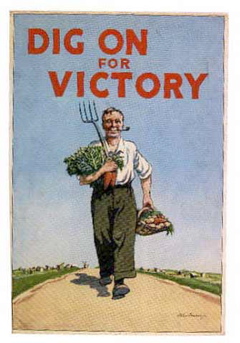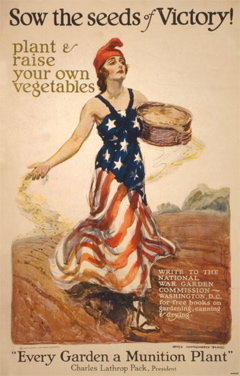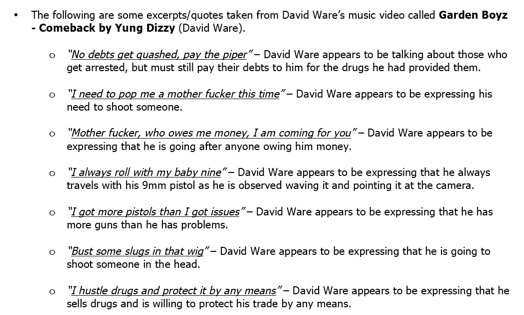I’ve mentioned Victory Gardens here a few times before. They came into vogue during the Second World War, when, unlike now, American citizens had been asked to sacrifice at home so that a war could be fought and won. People were asked to grow their own produce. Every carrot not eaten here, after all, was a carrot that could be canned and sent to our soldiers, and every gallon of gas that wasn’t spent hauling produce to your grocer was a gallon that could be poured into a bomber making runs into enemy territory. I’ll have to call my grandmother later to verify this, but I don’t suspect there was much complaining about it. People just did what they had to do. They knew that freedom hung in the balance. So, women got together at night and sewed blankets for our solders, kids collected scrap metal that could be used to make planes, and families, by and large, played by the rationing rules. And, a hell of a lot of them started gardening.
 An estimated 20 million Americans took part in the Victory Garden initiative, and, according to Wikipedia, they produced nearly 40% of the vegetable produce consumed in the nation. Vacant lots were commandeered, as were roofs and patios. Even sections of Golden gate Park in San Francisco were cultivated… For those interested, a great 1940’s newsreel on the initiative can be found at Archive.org.
An estimated 20 million Americans took part in the Victory Garden initiative, and, according to Wikipedia, they produced nearly 40% of the vegetable produce consumed in the nation. Vacant lots were commandeered, as were roofs and patios. Even sections of Golden gate Park in San Francisco were cultivated… For those interested, a great 1940’s newsreel on the initiative can be found at Archive.org.
I love the story. I love the fact that there was a time when Americans pulled together and sacrificed for the greater good. There’s something very romantic and appealing about that, especially in a time when we all feel so disconnected from our neighbors and our communities (and, for that matter, the earth).
It wasn’t exactly an original idea, as Amy Franceschini, who I’ve told you about here before, had been doing something similar in San Francisco, but I started wondering whether or not it might be feasible to kick off a national campaign around the new Victory Garden, focusing on, instead of war, the fuel consumed in shipping produce from Honduras and hauling it from Mexico, and what it costs us, environmentally speaking. “Victory Gardens against Global Warming,” has a nice ring to it, I think. (I suspect there are a lot of people out there, like me, who are looking for real, tangible ways to join in the fight against global warming, and it would be great to give them something to do.)
 So, I had a beer a few days ago with my friend Amanda, the Director of the local pro-gardening organization Growing Hope, and we talked about rolling out a southeast Michigan pilot program. (I’ve since also exchanged notes with Amy Franceschini and it sounds as though she’s planning to take her program outside of San Francisco shortly, so the two initiatives could dovetail nicely.) Of course, as it’s already April 24, it doesn’t leave us much time for this year, but here’s the idea, in a nutshell.
So, I had a beer a few days ago with my friend Amanda, the Director of the local pro-gardening organization Growing Hope, and we talked about rolling out a southeast Michigan pilot program. (I’ve since also exchanged notes with Amy Franceschini and it sounds as though she’s planning to take her program outside of San Francisco shortly, so the two initiatives could dovetail nicely.) Of course, as it’s already April 24, it doesn’t leave us much time for this year, but here’s the idea, in a nutshell.
We launch a Michigan-specific Victory Garden site, which includes video tutorials (like that one I showed you a little while ago on indoor composting) on building raised vegetable beds, planting, etc. All the plans will be available for free, however, if people wanted to, they could also purchase components (cedar for the raised beds, worm castings, soil, seeds, etc) from Growing Hope. The key thing is that we’d have everything laid out very clearly for the new gardeners among us. We’d do the research as to which vegetable varieties work best in our climate, and we’d suggest a mix of plants. (Maybe the seeds would be available for free, if we could get donations to cover them.) The main thing is that we’d have a simple Do-It_Yourself starter kit… Like I said, we’re getting into this really late, but we think it’s still possible. So, this next week we’ll be exploring it some more, and then we’ll decide to either do it now or hold off for a season… If you have thoughts, or if you’d like to join the team, let me know. If we do get this off the ground, we’ll need a ton of help with everything from the building of demo gardens and packaging seeds to launching a website and shooting video.



 An estimated 20 million Americans took part in the Victory Garden initiative, and, according to Wikipedia, they produced nearly 40% of the vegetable produce consumed in the nation. Vacant lots were commandeered, as were roofs and patios. Even sections of Golden gate Park in San Francisco were cultivated… For those interested,
An estimated 20 million Americans took part in the Victory Garden initiative, and, according to Wikipedia, they produced nearly 40% of the vegetable produce consumed in the nation. Vacant lots were commandeered, as were roofs and patios. Even sections of Golden gate Park in San Francisco were cultivated… For those interested,  So, I had a beer a few days ago with my friend Amanda, the Director of the local pro-gardening organization
So, I had a beer a few days ago with my friend Amanda, the Director of the local pro-gardening organization  I read somewhere today that Google AdWords has paid out
I read somewhere today that Google AdWords has paid out 









